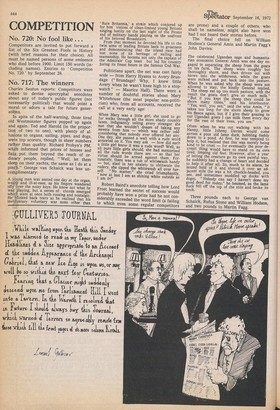COMPETITION
No. 720: No fool like ...
Competitors are invited to put forward a list of the Six Greatest Fools in History (with brief reasons for their choice). All must be named persons of some eminence who died before 1900. Limit 150 words (including names). Entries to ' Competition No. 720' by September 28.
No. 717: The winners
Charles Seaton reports: Competitors were asked to devise apocryphal anecdotes about any of today's public figures (not necessarily political) that would point a moral or adorn a tale for future generatttlns.
In spite of the half-warning, those tired old Westminster figures popped up again and again. Ted and Harold (in the proportion of two to one), with plenty of allusions to organs, sailing, pipes, and dogs, were top scorers, though in sheer numbers rattler than quality. Richard Probyn's PM, whOn informed that prices of houses and flak, a put them beyond the reach of ordinary people, replied, "Well, let them sleep on their yachts, the same as I do at a pinch." George van Schaick was less uncomplimentary:
A y9 ng man was seated one day at the organ, we.* and ill-at-ease, as his fingers wandered idlY"i ver the noisy keys. He knew not what he was j6laying, but a series of chords emerged which were at once both rousing and nostalgic. He blinked back tears as he realised that his involuntary voluntary was none other than
'Rule Britannia,' a strain which conjured up for him visions of clean-limbed young Britons singing lustily on the last night of the Proms md of military bands playing on the seafront of his beloved Broadstairs.
From that moment he devoted his life to the twin aims of leading Britain back to greatness and demonstrating that the island race had lost none of its heritage of sailing and seamanship. He became not only the captain of the Admirals' Cup team but led his country luring its finest hours in the famous Cod War.
Politicians apart, the net was cast fairly wide — from Harry Hyams to Avery Brundage (" Brundage? Why, I knew little Avery when he wasn't knee high to a stopwatch" — Maurice Hall). There were a number of doubtful stories about Mary Whitehouse (the most popular non-politician) who, from all accounts, received the call at a very early age:
When Mary was a little girl, she used to go for walks through all the more shady country lanes, indignantly telling every stranger she met that she wouldn't dream of taking any sweets from him — which was rather odd. considering that nobody ever offered her any. One day, she passed a wall with a rude word scrawled on it. You may ask — how did such a little girl know it was a rude word? Well, as all pure little girls should, she had memorised all the rude words there are — so that her virtue should be armed against them. Fortunately, there was a tub of whitewash handy — but, alas! in her anxiety to obliterate the rudery, she tipped the whitewash all over herself. "No matter," she cried triumphantly, " now at last I am as shining white outside as I am in!"
Robert Baird's anecdote telling how Lord Frost learned the secret of success would probably have won a prize had he not considerably exceeded the word limit (a failing to which even some regular competitors are prone) and a couple of others, who shall be nameless, might also have won had I not heard their stories before.
The final choice fell on William Hodson's General Amin and Martin Fagg's John Davies:
The celebrated Ugandan sage and humanitarian economist General Amin was one day engaged in separating the sheep from the goats on his farm. The sheep were roughly but thoroughly shorn, and then driven out with blows into the wilderness, while the goats were milked and put back into the pasture. When he was asked why the sheep were not allowed to stay, the kindly General replied, "The sheep eat up too much pasture, with the result the goats don't give so much milk." "But if you kept the sheep they could be shorn many times," said his interlocutor. "Yes, well, you see," said the wise Amin, "it takes too long for the shorn sheep to grow his fleece again, but if I give their grazing to our Ugandan goats I can milk them every day for the rest of their lives, you see."
Often. when he was out walking with his Nanny, little Johnny Davies would come across a poor old lame duck, hobbling feebly down to a pond. At first, he was tempted to help it, but realised that this was merely being kind to be cruel — for eventually the poor decrepit thing would have to stand on its own tired, limping old feet. However, after a year of letting the creature go its own painful way, he suddenly had a change of heart and decided to help it after all. So, much to its alarm, he seized hold of it and shoved it over an adjacent stile (he was a bit chuckle-headed, you see, and sometimes muddled up ducks with dogs). "Nobody can say I haven't done my good deed for today," he beamed, as the lame duck fell off the top of the stile and broke its neck.
Three pounds each to George van Schaick, Rufus Stone and William Hodson, and two pounds to Martin Fagg.


































 Previous page
Previous page